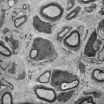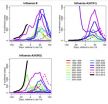(Press-News.org) New Haven, Conn. — In a major breakthrough for uterine serous carcinoma (USC) — a chemo-resistant, aggressive form of endometrial cancer, Yale researchers have defined the genetic landscape of USC tumors, findings that point to new treatment opportunities.
The collaborative team—which included researchers with expertise in gynecological cancer, genomics, and computational biology— identified a number of new genes that are frequently mutated in USC. The results of this comprehensive genetic analysis of USC are published in the Jan. 28 Proceedings of the National Academy of Sciences (PNAS) online early edition. The researchers were supported as part of a collaborative program with Gilead Sciences, Inc.
Endometrial cancer is the most prevalent gynecologic tumor in women, with over 47,000 newly diagnosed cases and about 8,000 deaths in 2012 in the United States alone. Patients with type I endometrial cancer tumors generally have a good outcome, but those with type II, or USC, have more relapses and deaths, and the disease is more aggressive.
"We have clearly identified the mutations that are responsible for USC tumors," said senior author of the study Alessandro Santin, M.D., professor of obstetrics, gynecology and reproductive sciences at Yale School of Medicine, and program leader of the gynecological cancers program at Smilow Cancer Hospital at Yale-New Haven and a member of Yale Cancer Center. "In addition to a number of well-known cancer genes, we found three genes that had not previously been associated with cancer that are found in these tumors. This finding points to new pathways that could be important in developing therapies down the road."
The team collected tumors from 57 women affected with USC to try to determine the molecular basis of the tumor's aggressive behavior. They sequenced all the genes from the tumors and identified mutations that are crucial for these tumors to grow. The team also studied the copy number variations—genes that are not mutated but are amplified in the tumors to give them a growth advantage over normal tissues.
The newly-identified cancer-related genes included two — CHD4 and MBD3 — that are found in the same protein complex and play a role in remodeling the genome to allow certain regions to be turned on and off. The discovery of a third gene, TAF1, was a surprise to researchers because it is a core component of the machinery responsible for transcribing a large fraction of the protein coding genes in the human genome.
"The detailed study of different cancers continues to produce new and unexpected discoveries," said corresponding author Richard P. Lifton, M.D., Sterling Professor, chair of genetics at Yale, and a Howard Hughes Medical Institute investigator. "These new findings define the biological basis of this cancer, and suggest new opportunities for personalized therapy."
###
Other authors on the study include first author Siming Zhao, Murim Choi, John D. Overton, Stefania Bellone, Dana M. Roque, Emiliano Cocco, Federica Guzzo, Diana P. English, Joyce Varughese, Sara Gasparrini, Ileana Bortolomai, Natalia Buza, Pei Hui, Maysa Abu-Khalaf, Antonella Ravaggi, Eliana Bignotti, Elisabetta Bandiera, Chiara Romani, Paola Todeschini, Renata Tassi, Laura Zanotti, Luisa Carrara, Sergio Pecorelli, Dan-Arin Silasi, Elena Ratner, Masoud Azodi, Peter E. Schwartz, Thomas J. Rutherford, Amy L. Stiegler, Shrikant Mane, Titus J. Boggon, and Joseph Schlessinger.
In addition to Gilead, the study was funded in part by grants from the National Institutes of Health, the National Cancer Institute, and the Howard Hughes Medical Institute.
Citation: PNAS doi/10.1073/pnas.1222577110
END
DURHAM, NC -- Duke University biomedical engineers have developed a new delivery system that overcomes the shortcomings of a promising class of peptide drugs – very small proteins – for treating diseases such as diabetes and cancer.
There are more than 40 peptide drugs approved for use in humans and more than 650 are being tested in clinical studies. One example is the hormone insulin, a peptide that regulates the metabolism of carbohydrates in the body and is used as a drug to treat diabetes.
Despite their effectiveness, peptide drugs cannot achieve their full potential ...
The 2011 annual report of the National Audit of Percutaneous Coronary Intervention (PCI) highlights the significant progress within hospitals to expand PCI services to treat more patients with acute coronary syndromes.
PCI mechanically improves blood flow to the heart and can be used to relieve the symptoms of angina, prevent and treat heart attacks. When used to treat heart attack patients, the procedure is called primary PCI. Commissioned and funded by the Healthcare Quality Improvement Partnership, the National Audit of PCI is clinically led by the British Cardiovascular ...
ROCHESTER, Minn. -- Cardiac disease is associated with increased risk of mild cognitive impairment such as problems with language, thinking and judgment -- particularly among women with heart disease, a Mayo Clinic study shows. Known as nonamnestic because it doesn't include memory loss, this type of mild cognitive impairment may be a precursor to vascular and other non-Alzheimer's dementias, according to the findings published online Monday in JAMA Neurology.
Mild cognitive impairment is an important stage for early detection and intervention in dementia, says lead author, ...
The Earth's forests perform a well-known service to the planet, absorbing a great deal of the carbon dioxide pollution emitted into the atmosphere from human activities. But when trees are killed by natural disturbances, such as fire, drought or wind, their decay also releases carbon back into the atmosphere, making it critical to quantify tree mortality in order to understand the role of forests in the global climate system. Tropical old-growth forests may play a large role in this absorption service, yet tree mortality patterns for these forests are not well understood. ...
For more than two decades, scientists have relied on studies that linked juvenile primate tooth development with their weaning as a rough proxy for understanding similar developmental landmarks in the evolution of early humans. New research from Harvard, however, is challenging those conclusions by showing that tooth development and weaning aren't as closely related as previously thought.
Using a first-of-its-kind method, a team of researchers led by professors Tanya Smith and Richard Wrangham and Postdoctoral Fellow Zarin Machanda of Harvard's Department of Human Evolutionary ...
This press release is available in German.
Unlike the brain and spinal cord, the peripheral nervous system has an astonishing capacity for regeneration following injury. Researchers at the Max Planck Institute of Experimental Medicine in Göttingen have discovered that, following nerve damage, peripheral glial cells produce the growth factor neuregulin1, which makes an important contribution to the regeneration of damaged nerves.
From their cell bodies to their terminals in muscle or skin, neuronal extensions or axons in the peripheral nervous system are surrounded ...
Alexandria, VA – Would you drink water from a toilet? What if that water, once treated, was cleaner than what comes out of the faucet? Although the imagery isn't appealing, as climate change and population growth strain freshwater resources, such strategies are becoming more common around the world — and in the United States.
Over the last several decades, local and regional water shortages have become increasingly common. These shortages have led to increased friction over water resources. Technologies are currently being developed to help make wastewater recycling ...
Using an exotic form of silicon could substantially improve the efficiency of solar cells, according to computer simulations by researchers at the University of California, Davis, and in Hungary. The work was published Jan. 25 in the journal Physical Review Letters.
Solar cells are based on the photoelectric effect: a photon, or particle of light, hits a silicon crystal and generates a negatively charged electron and a positively charged hole. Collecting those electron-hole pairs generates electric current.
Conventional solar cells generate one electron-hole pair ...
SEATTLE – Regular consumption of deep-fried foods such as French fries, fried chicken and doughnuts is associated with an increased risk of prostate cancer, and the effect appears to be slightly stronger with regard to more aggressive forms of the disease, according to a study by investigators at Fred Hutchinson Cancer Research Center.
Corresponding author Janet L. Stanford, Ph.D., and colleagues Marni Stott-Miller, Ph.D., a postdoctoral research fellow and Marian Neuhouser, Ph.D., all of the Hutchinson Center's Public Health Sciences Division, have published their findings ...
The American public can expect to add earlier and more severe flu seasons to the fallout from climate change, according to a research study published online Jan. 28 in PLOS Currents: Influenza.
A team of scientists led by Sherry Towers, research professor in the Mathematical, Computational and Modeling Sciences Center at Arizona State University, studied waves of influenza and climate patterns in the U.S. from the 1997-1998 season to the present.
The team's analysis, which used Centers for Disease Control data, indicates a pattern for both A and B strains: warm winters ...




